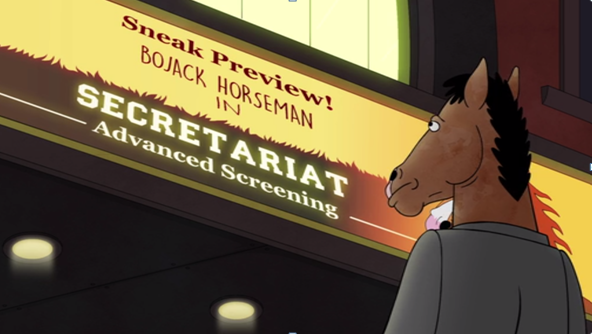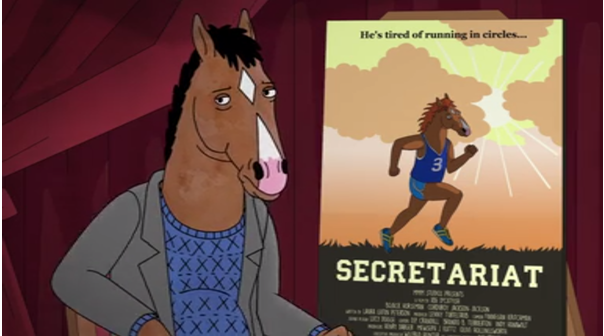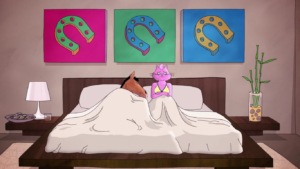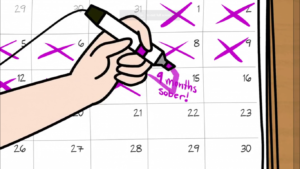Bojack Horseman ended its phenomenal second season with its protagonist flat on his back physically exhausted and emotionally destroyed after committing potentially the worst sin in a life that is full of contenders to choose from. The moment that saves the character (as well as the viewer and the season as a whole) from suicidal depression is the appearance of a jogger who has been glimpsed throughout the season telling Bojack that to improve his fitness (and on a larger scale, his life) he has to work at bettering himself every day. The jogger promises that “every day it gets a little easier. But you gotta do it every day, that’s the hard part. But it does get easier”. Thus the season ends on a fairly bright note and if the series had ended there we could live in hope that Bojack Horseman went on to a well lived life, making empowering decisions and continuing to climb upwards after finally hitting rock bottom. But the series didn’t end there. Bojack Horseman, the program, continues into a third season because it has been a huge success for Netflix. Bojack Horseman, the character, therefore must also continue to exist and from the first episode of the third season it is clear that a happy ending is still a world away for this emotionally shattered character.
The season opens on Bojack sitting through mind numbing press junkets for his new movie Secretariat, the film that will finally earn him the critical and commercial recognition that he has always craved. Bojack, however, knows that he hasn’t earned this praise; his performance was digitally rendered without his presence and the film itself is Oscar baiting schmaltz of the worst kind. Bojack has always had trouble reconciling his wealth and celebrity status with the fact that he earned everything he has through fairly shoddy work and part of the tragedy of this show is that Bojack naively believes that if he could just do better work and be taken more seriously then he may be able to achieve permanent happiness. This incorrect assumption of Bojack’s is challenged multiple times throughout the episode and will surely become one of the major themes of this third season.
In the early minutes of the episode it appears that since we left Bojack last season he has begun to work on genuinely bettering himself in small, easily manageable ways. The most notable examples of this are his apologies and positive reinforcements to his friends Todd and Diane after outbursts towards them. It would be too far a removal from the Bojack that we have known for two years for him to suddenly stop berating his friends entirely. The fact that he acknowledges this bad behaviour though, and rectifies it by making it known to his loved ones how important they are to him makes it appear as though Bojack really has taken on board the idea that he needs to change these little things in order to achieve a positive change on a grand scale. His attitude in the opening stages of this episode is a far cry from his overcompensating Brand New Attitude at the beginning of the second season and this appears to be a much more genuine attempt at self improvement. However, it doesn’t take long for the cracks in Bojack’s fragile new shell to start appearing.
Whilst in the midst of a meaningless sexual encounter, a throwaway phrase uttered by his partner for the night turns Bojack desolate as he reflects upon the horrific decision that he made at the end of season two when he took advantage of Penny, the drunken teenager daughter of Charlotte, the woman that he told himself for years can change him into the man he wants to be. Bojack is correct to acknowledge that he did a terrible thing but his refusal to forgive himself means he cannot allow himself to feel happiness and begin to heal. This is legitimately toxic and depressive thinking and it is what has led him to making similar terrible decisions in the past. Bojack believes that if he doesn’t deserve happiness then why should he even try to attain it? Why not throw everything away and wallow in despair and depression? There is a moment in this episode when Bojack fears that he has pre-emptively thrown away all of his impending success and he later confesses that the thought of that reality made him feel relieved. He is more comfortable with failure and self loathing than he is with loving himself and receiving love from others because he does not believe that he truly deserves anything more in his life than loathing and hate. Any viewer who has watched the first two seasons of this show knows that this behaviour stems from a childhood of abuse and victimisation from his alcoholic and distant parents, particularly his mother.
Thinking through these plot points it cannot be overstated just how remarkable it is that an animated show about a talking horse is exploring humanity in such a beautiful and devastating way. I, like presumably most of the show’s viewers, went into the first season expecting a fairly light comedy that wouldn’t go much deeper than animal puns and nice animation work. In reality, what we have been given is one of the wittiest comedies currently on television that has somehow also managed to take over the mantle in Mad Men’s absence as the premier show for exploration of the human psyche and the depths of depression (as Vox’s Todd VanDerWerff has written on). Heading up an incredible cast list, which includes Breaking Bad’s Aaron Paul and Community’s Alison Brie, is Will Arnett who (whilst it may seem like sacrilege to any die hard Arrested Development fans) is doing career best work as Bojack. Arnett, along with the show’s writers and creator Raphael Bob-Waksberg, has done an amazing job at making it seem incredibly possible that a horse is currently the most recognisably human character on television.

Bojack’s inevitably fruitless search for enduring happiness is perhaps what connects most strongly with the show’s audience and is also perhaps the strongest link of all to Mad Men’s Don Draper. Like Draper, Bojack searches for happiness in money, sex, and success in his work but in the world of both of these programmes, it is never enough. When Bojack’s old acquaintance Jill Pill tells Bojack in this episode that nothing lasts the way he would like it to, Bojack retorts that if he wins an Oscar for Secretariat he’ll be remembered. Jill’s reply cuts Bojack’s entire outlook down in three words: “and then what?” This deceptively simple question is something that Bojack never has an answer for. Later in the episode Bojack’s handler, Ana Spanakopita, tells him that “the day after you win an Oscar, you go back to being you. But that night is a really good night”. Bojack’s problem is that for him to feel happy he thinks that the high of that night should be permanent. Eternal happiness is something that nobody can realistically attain in life, let alone somebody with the years of abuse (both self inflicted and otherwise) that Bojack has endured. As a certain other television anti-hero has told us in the past, “[happiness] is a moment before you need more happiness”. The ‘trick’ is to attempt general day-to-day contentedness, but to achieve that you need to work at it every day (as Bojack now knows) and be able to look in the mirror and accept the decisions you have made and the actions you have taken. It is only then that life can become bearable, and then eventually, hopefully something more. As we begin season three of Bojack Horseman it appears as though our protagonist is still a long way away from reaching that point.



